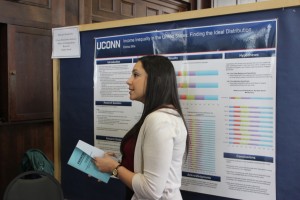Thesis: Committed to Inequality? How Learning about Inequality Changes Preferences for Redistribution
Thesis Supervisor: Thomas Hayes, Political Science
Over the past forty years, economic inequality in the United States has increased to such extreme levels that it has distorted the American economy and the health of American Democracy. Research on the effects of inequality on our economic and political institutions has been comprehensive, but recent events have shed light on the importance of studying public opinion on economic inequality as well. The Occupy Wall Street movement in 2011, for example, was a grassroots campaign focused on inequality. Although division along class lines in politics is not new, this year’s election cycle has mobilized huge groups of American voters around the issue of economic inequality. It has tapped into deeply rooted sentiments about how much people have and what they feel they deserve. The significant consequences of economic inequality, and the newfound vigor with which people are mobilizing around the issue, has prompted me to focus my Honors thesis on public opinion about it.
I used a survey to test how participants’ beliefs about the fairness of the economic system affects their preferences for inequality-reducing policies. I then tested whether increasing the saliency of inequality by prompting participants to engage in learning tasks has a long-term effect on preferences. One major problem with designing a survey experiment is that public opinion is easily swayed by inflammatory rhetoric or trigger words. It was important that, in testing preferences, I used very carefully selected language to ensure that the results were not skewed by emotionally-charged reactions to words like “welfare” or “socialism.” Creating the survey required intensive research into public opinion data and a pilot study using different variations of words.

I found that participants who held meritocratic beliefs were slightly more supportive of programs intended to reduce inequality, but that the effect of learning tasks was only significant in the short-term. This finding was particularly interesting in a time when economic inequality has become a highly visible issue; it indicates that increasing the saliency of the issue may not follow citizens into the polling booths.
by Emma Sifre
Individualized Major: The Interdisciplinary Study of Economic Inequality